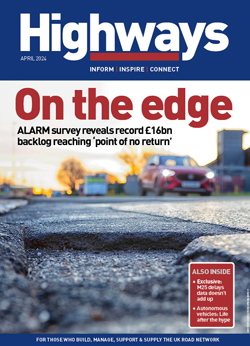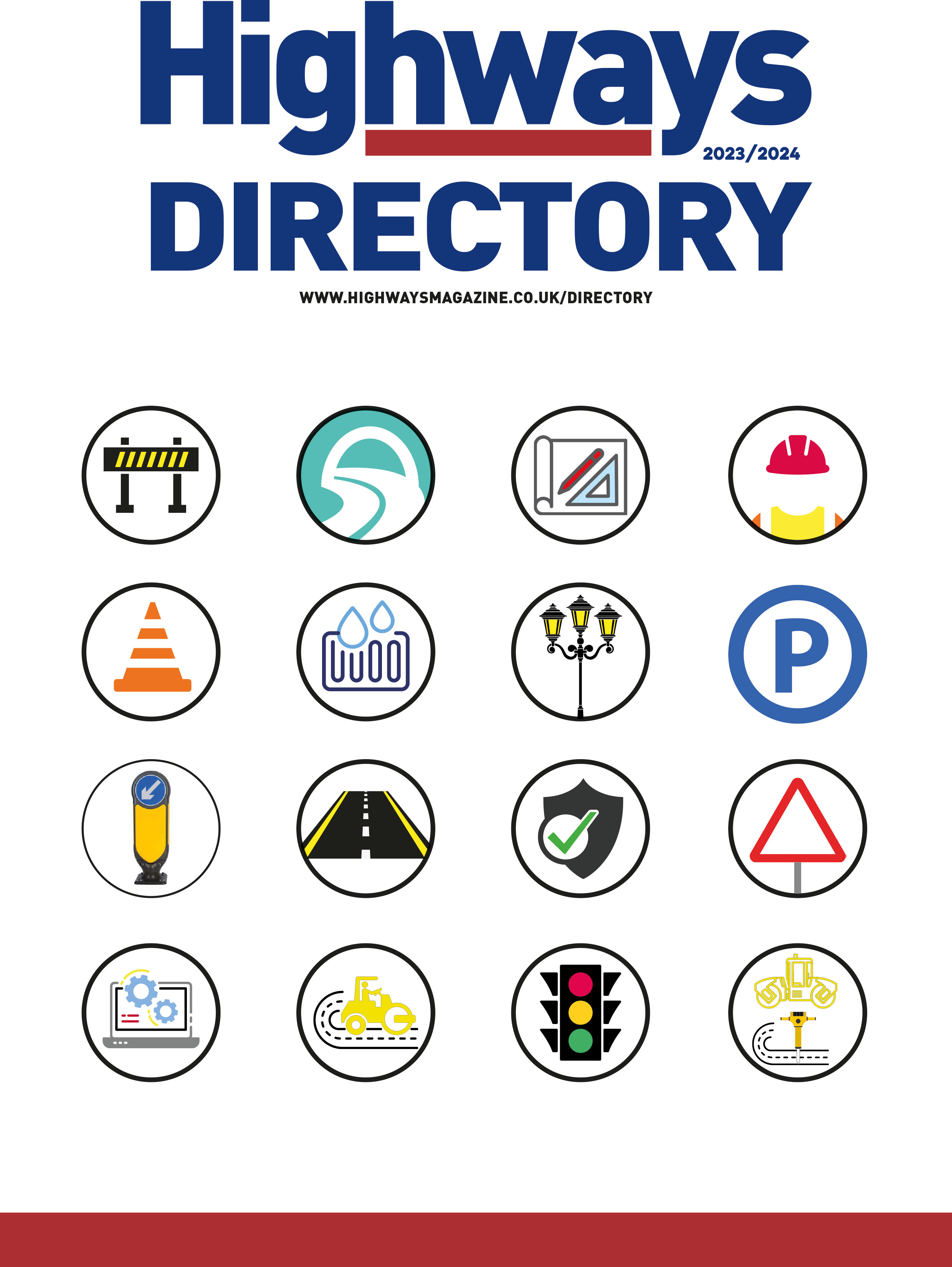Chris Ames talks to Elliot Shaw – Highways England’s executive director of strategy and planning – about money, technology, safety and progress under the current RIS.
In December, the government-owned company published its Strategic Road Network Initial Report, which looks forward to the next Road Investment Strategy from 2020-25 (RIS2). After reports suggested that Highways England is asking the Government for £30bn for RIS2, Highways asked Mr Shaw whether this was true.
‘This [Initial Report] is about setting out our advice and thoughts to government on what the investment priorities will be for 2020 to 2025. So what this isn’t, is a budget or anything finalised as part of the next Road Investment Strategy, which is published in summer 2019. But we do require that this will be a £30bn programme of works to upgrade our motorways and A roads.
‘We recognise that that is a significant increase, but we think that is a good thing for our customers [and] a good thing for the supply chain. We’ve done a bunch of analysis that is set out in the report.
‘If you look at [traffic] data, that will increase by about 30% in the next 25 years. If we don’t do anything on that then delays and the amount of time that people will spend in traffic queues are going to about double. There are some big challenges that we are trying to set out in the initial report.’
Reflecting the emphasis that Highways England has put on new technology, Mr Shaw says there are also some real opportunities in what he calls ‘an era of roads revolution’. He points to some of the major changes that the road network is expected to see in the future, such as connectivity, Mobility as a Service and how we use cars.
Aspirations
The Initial Report set out what it called eight aspirations:
- focus on operations, maintenance and renewals
- build the smart motorway spine of the network
- roll out expressways
- undertake transformational investments
- deliver a balanced programme
- renew focus on small schemes
- deliver through refined designated funds
- and prepare for the future.
Mr Shaw says: ‘There’s a lot there in the priorities. In 2020 to 2025, these are the things we think we should focus on.’
He adds that placing the focus on operation and renewals first will lay the foundations. Beyond this, he says: ‘We do want to build our smart motorway spine and develop expressways. We recognise there’s a bunch of transformational investment that we really want to drive forward on – the Lower Thames Crossing, the Oxford to Cambridge [expressway] that the Government announced. We want to balance that with more small to medium schemes. We also want to continue with designated funds.’
Technology
As Highways England published the Initial Report, chief executive Jim O’Sullivan said that a system using a fibre optic network would build on smart motorways by communicating with connected and autonomous vehicles, including directly controlling their speed.
Later in December, the company awarded telent Technology Services Ltd a seven-year contract worth £450m to manage and renew the National Roads Telecommunications Service (NRTS), the communications network that sits at the heart of smart motorways.
Mr Shaw tells Highways: ‘We need to create the smart motorway spine of the network. As part of that expansion, that will include expanding the technology. Initially that’s about creating more capacity and then also providing the technology that enables us to keep the traffic running smoothly, but we do want to start building on that. One of the things that was announced at Budget is that we’re going to trial a method of 5g connectivity and look at how we can in effect create communication networks that enable us to interact more directly with the vehicles.
‘If we get increasingly connected vehicles, that builds on the fibre optic cables and will require more of that technology to sit beside it. So the fibre optics I think is the foundation. Having the tools for smart motorways, as you look to get connectivity and connected vehicles and then eventually autonomous vehicles.’
Designated funds
The designated funds listed in the Initial Report are almost the same as for the current RIS period but with what Mr Shaw describes as ‘tweaks, rather than wholesale change’.
A fund for ‘cycling, safety and integration’ has been replaced with a proposed stream for ‘connecting communities’. Where the current fund aimed to create an accessible and integrated network, the new one aims to ‘create more, safer, and better links for pedestrians, cyclists, and horse riders’. No proposed new fund specifically covers safety.
The Initial Report also drops a specific fund for air quality in favour of roadside facilities. It says: ‘We want to respond to customer feedback to improve roadside services and believe designated funding could support this. This could involve working with Motorway Service Area operators to improve the facilities available for customers, as well as providing rest stops along A-roads.’
Mr Shaw says: ‘A lot of our thinking is particularly on A roads. We’re thinking that there could be better roadside facilities on A roads. We are quite interested in looking at that. It’s one of the issues that Transport Focus has raised.’
Mr Shaw says the tweaks to designated funds will enable Highways England to ‘deliver more bangs for bucks and be a little bit more flexible in how we deliver them’.
‘We also work a bit more creatively with stakeholders and the supply chain in how we deliver them’.
Highways pointed out that while safety is Highways England’s number one imperative it is not specifically listed as an aspiration in its own right in the Initial Report.
Mr Shaw responds: ‘I would say safety underpins everything that we do and if you look at those eight [aspirations], safety is pretty much at the heart of almost all of them.’
He points out that the focus on operations, maintenance and renewal, provides safety through a well-maintained and high quality network. He adds: ‘We believe that expressways are a really important way of improving safety.
‘Again some of the exciting things about how we prepare for the future is the new technology. Autonomy – even the lower levels of autonomy, the more immediate intelligent vehicles, should all be about safety and creating a safe vehicle environment.
‘We do talk about our ambitions and our imperatives in the document and while these are delivering aspirations, these are the things that deliver a safe network.’
Transformation
Invited to give a couple of examples of what might be the transformational investments in RIS2, Mr Shaw said: ‘This will be the period where we are really constructing the A303 and Lower Thames Crossing. When we talk about those [new] transformational investments, we’re mainly focused on the strategic studies. There’s a part of the document that looks at the strategic studies, most notable within that, given the recent announcement at Budget, is Oxford to Cambridge.’
He adds: ‘The other strategic studies are important as well’, citing the M60 in Manchester.
Coinciding with the beginning of the next roads period, 2020 will see the establishment of a National Roads Fund, which will ring-fence Vehicle Excise Duty to Highways England’s strategic road network and, on current plans, a major road network of key local authority roads. Highways asked whether this would see Highways England generate more real-time accountability so that its customers can see directly how the schemes they are funding are progressing.
From Mr Shaw’s response, it seems that Highways England sees its approach to increasing accountability in this new era as an evolution rather than a step change. He cites the accountability Highways England already provides through the Office of Rail and Road, which reports publicly on its progress and Transport Focus as the customer watchdog.
He adds: ‘We do often publish information about our schemes and our progress. One of the aspirations we set out in the Initial Report is that we recognise that we can do even more in terms of our presentation our plans and I think there is an aspiration to publish more. Also one of the things we have talked about is how do we do that in different ways. So obviously we are increasingly trying to use [information on] a website and things like Twitter.
‘We’ve also got something called the Chatty Van that goes round, and one thing we’ve been talking about is: do we want to have a van that goes to motorway service stations to talk to customers directly.
‘So I think we definitely aspire to do more to engage with our customers in new ways and increasingly directly. Obviously one of the challenges is to find the right methods to do that. The Chatty Van, which we’ve used for specific projects, but also in our East region, feels like a really good example. Ideally we would do more of that.’
With such ambitious plans, it seems the Chatty Van (pictured) will have a lot to say.




